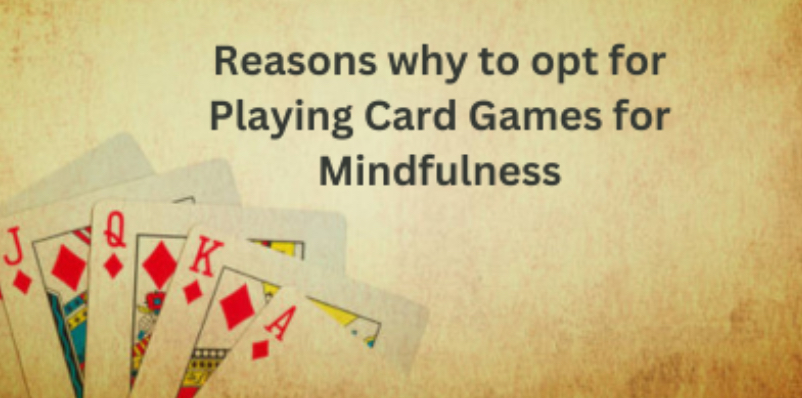In the hustle and bustle of our modern lives, finding moments of peace and mindfulness has become a paramount quest. Amidst various mindfulness practices, one often overlooked gem is playing card games. Engaging in card games isn’t just about entertainment; it’s a portal to enhanced mindfulness and well-being. Let’s explore the compelling reasons why opting for playing card games can be a mindful journey.
1. Focus and Concentration:
Card games demand a high level of focus and concentration. Whether you’re strategizing in a game of Poker or tracking cards in a game of Blackjack, the need for undivided attention sharpens your cognitive abilities. This intense focus is a core element of mindfulness, as it encourages the mind to be present in the current moment, fostering a state of mental clarity.
2. Stress Reduction:
Card games offer a therapeutic escape from stress. Engaging in games like Solitaire or Rummy games creates a serene, meditative environment. The rhythmic shuffling of cards, the tactile engagement with the game, and the structured nature of card play collectively work to alleviate stress. This mindful diversion provides a temporary reprieve from daily pressures, allowing the mind to reset and recharge.
3. Social Connection:
Card games, whether played with family or friends, foster social connection. The act of sitting around a table, sharing laughter, and engaging in friendly competition contributes to emotional well-being. These social interactions are crucial for mindfulness, as they ground individuals in the present moment and build a sense of belonging.
4. Strategic Thinking:
Card games are a playground for strategic thinking. Whether you’re calculating probabilities in Poker or planning your moves in Bridge, these games stimulate the brain’s strategic centers. This mental exercise promotes mindfulness by compelling players to stay attuned to the unfolding game dynamics, honing their ability to make thoughtful decisions in the present moment.
5. Patience and Acceptance:
In card games, the key is to learn to accept the cards dealt, adapt to changing circumstances, and wait for the right moment to make a move cultivates patience. This practice of patience is an integral aspect of mindfulness, teaching individuals to accept the present situation without unnecessary resistance.
6. Mindful Observations:
In card games, keen observation is a key to success. Whether it’s reading your opponent’s expressions in Poker or keeping track of cards in a game of Spades, the games encourage heightened awareness. This focus on the present moment, on the nuances of the game, is a mindfulness exercise that transcends the gaming table, enhancing one’s ability to observe and appreciate details in daily life.
7. Emotional Regulation:
Card games provide a safe space to explore and regulate emotions. The highs of a winning hand and the lows of a challenging game mirror life’s emotional spectrum. Learning to navigate these emotional ebbs and flows in a controlled environment fosters emotional intelligence and resilience, both of which are key components of a mindful mindset.
8. Mindful Rituals:
Engaging in card games often involves rituals – shuffling, dealing, and the rhythm of play. These rituals create a sense of order and predictability. The repetitive nature of these actions becomes a form of meditation, grounding individuals in the present and signaling the mind to transition into a more mindful state.
9. Creativity and Adaptability:
Card games are not just about following rules; they often require creative thinking and adaptability. Whether you’re crafting a winning strategy or navigating unexpected challenges, these games stimulate the creative centers of the brain. This infusion of creativity enhances mindfulness by encouraging individuals to approach situations with an open mind and a willingness to adapt.
10. Time Management:
Lastly, card games teach effective time management. The finite nature of a game session, whether quick rounds of Uno or more extended games like Bridge, instills a sense of temporal awareness. This heightened awareness of time promotes mindfulness by encouraging individuals to savor and fully engage in the current moment, making the most of the time spent playing.
In conclusion, the act of playing card games transcends mere recreation; it becomes a mindful journey. The strategic thinking, emotional regulation, and social connections fostered at the card table ripple into daily life, enhancing overall well-being. So, the next time you pick up a deck of cards, remember that you’re not just playing a game – you’re engaging in a mindful practice that can positively impact your mental and emotional state.

